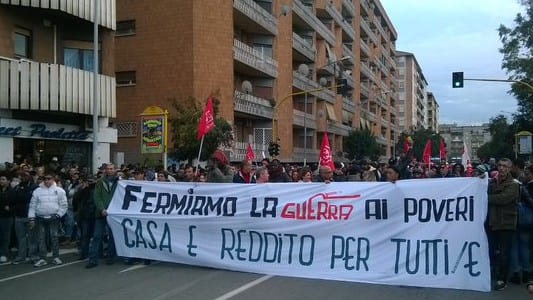
by Kate McFarland | Jul 16, 2016 | Research
Lithuania has received little attention in the global movement for universal basic income. In June of this year, however, Algimantas Laurinavičius and Antanas Laurinavičius, members of Faculty of Economics at Lithuania’s Vilnius University, published a brief investigation into the possibility of a UBI in Lithuania.
In general, the authors present a favorable view of basic income. In their conclusion, for example, they note, “Empirical research has proved that all the experimental basic income programmes decreased the level of poverty – the more generous the programme was, the stronger its effect was on the reduction of poverty” (p. 61).
This suggests that basic income could be a boon to Lithuania, which is “categorized as a country with high income inequality and high level of poverty risk.” Here, though, Laurinavičius and Laurinavičius are pessimistic — concluding that, at present, the Lithuania “state budget or social insurance fund budget are too small to pay-out sufficient benefits of basic income” (p. 62).
To read their full analysis (whether or not on the way to offer a second opinion on the Lithuanian situation), find the article below:
Algimantas Laurinavičius and Antanas Laurinavičius, “The Concept of Basic Income: Global Experience and Implementation Possibilities in Lithuania,” Business, Management, and Education, Vol. 14, No. 1; June 10, 2016.
Photo Lake Galve, Trakai, Lithuania CC Sek Keung Lo (flickr)
Thanks to my supporters on Patreon. (To see how you too can support my work for Basic Income News, click the link.)

by Kate McFarland | Jul 5, 2016 | Research
Dutch sociologist Dick Pels has published a new book, A Heart for Europe: The Case for Europatriotism, which is available for free download from Good Works Publishing Cooperative based in Bristol, UK.
The following is an introduction from the author:
European civilization is the never-ending quest for a more gentle, more relaxed, more trustful and less dangerous society: a society in which people are no longer afraid of each other, of their institutions, or of themselves. But Europe currently finds itself in the eye of a ‘perfect storm’, being chased by the multiple dangers of populist nationalism, Russian revanchism, neoliberal financial havoc, religious terrorism and refugee chaos. Facing these violent challenges, we urgently need to rethink our European ideals of peace, freedom, democracy, sustainability and the good life. It is urgent that we regain the original passion which lay behind the European project, in order to rescue the idea of a civilized European patriotism from the politics of fear which is conducted by both rightwing and leftwing nationalists.
Most of the book does not specifically address basic income; however, Pels does briefly make a case for a Europe-wide basic income in a chapter entitled “The European Good Life”.
While he does not foresee a basic income in the immediate future, Pels believes that Europeans might look forward to “something like an individualized European basic income, which would not only provide citizens with a guaranteed income but also relax the work ethic and relativize the political goal of full employment” (p. 102) — which he goes on to call a “eurodividend”.
Like the first legal state pension introduced in 1889 by Bismarck, who intended to outflank social democracy and to forge stronger ties between the newly united German states, such a ‘eurodividend’ could effectively bind citizens to the European project, while also removing economic imbalances within the eurozone and halting the social race to the bottom. It would lay a common European ‘social floor’ under the national welfare states, which would otherwise retain their diversity. As an individual share in the profits of European unification, the eurodividend would literally ‘make the profits of Europe visible for everyone’ (pp. 102-3).
Another major benefit of a “eurodividend”, according to Pels, is that it permits a more equitable distribution of time. Noting that a good life requires that “we win back command over our own time…from the economic production and consumption spheres,” Pels states, “A European basic income could be one way of distributing this time freedom more evenly and fairly. It would not only benefit the stressed-out multitaskers and burnt-out managers of the rich Northwest, but every EU citizen” (p. 104).
Read more about the book — or just download and read the book itself — at the publisher’s website.
Dick Pels has taught at various Dutch and English universities, and he was the director of the Bureau de Helling, the research foundation of the Dutch Green Party, until 2013. His previous English-language books include Property and Power, A Study in Intellectual Rivalry (1998), The Intellectual as Stranger (2000), and Unhastening Science (2003). He has also co-edited a volume on basic income, Het basisinkomen: sluitstuk van de verzorgingsstaat? (1995), with Robert van der Veen.
A guitarist and singer-songwriter, Pels writes and performs songs in the blues and folk-rock genres. He lives on the historic yacht Nymphaea.

by Sandro Gobetti | Jul 3, 2016 | Research
Article by Luca Santini and Sandro Gobetti (BIN Italia), published on Cadmus journal Vol. 2 Issue 6 may 2016.
Abstract
A feeling of uncertainty about the future as well as the perception that the past classical securities are gone are widely spread among people. Criticism or disaffection affects the majority of the traditional political forces of the European continent. It is not possible to talk about the European crisis without referring to the crisis of wage-based society. All political options of the past century have de facto put labour at the centre of society.
The post-classical era got its start in the ’80s when, for the first time since World War II, the phenomenon of mass unemployment affected Europe. The crisis of wage labour cannot be regarded as a temporary economic conjuncture of an otherwise unlimited growth; all consequences of the phase must be contemplated in order to design at once a society based on new principles.
For years, after the end of the Fordist system, nothing has been done to cope with the conditions of precarious workers. The issue of a guaranteed income is, therefore, crucial and inescapable in order to exit this long-term European crisis. The European Union should take a stand on the protection of human dignity and on the “right to exist”. Could basic income at the continental level be the basis for a social Europe? We are looking forward to it.
Click here to read the article in pdf.
Click here to download Cadmus Journal Vol. 2 issue 6 May 2016.

by Kate McFarland | Jun 27, 2016 | Research
Rasmus Schjoedt is the Social Policy Specialist at Development Pathways, a UK-based consultancy firm that “brings together a group of social policy experts with extensive international experience of working on social protection, social development, gender, financial inclusion, and livelihoods.”
Development Pathways states that its vision is the “global adoption of transformative social and economic policies that guarantee the realisation of the rights for all,” and its mission is to “provide creative evidence based and context specific solutions to social and economic policy challenges.”
Schjoedt wrote the April 25, 2016 edition of the Pathways’ Perspective blog on the topic of basic income experiment conducted in the Indian state of Madhya Pradesh from 2011 to 2012.
Despite a short implementation period and relatively low benefit levels, the effects were impressive: by the end of the project it was possible to see significant improvements in living conditions, nutrition and education.
With almost half of the world’s poorest living in India, how the country approaches social protection in the coming years will be very important for the global efforts to eliminate extreme poverty by 2030. A universal basic income could be an important part of the solution.
Schjoedt describes the experiment and its results in some detail in a paper available for download here.
Reference
Rasmus Schjoedt, “India’s Basic Income Experiment,” Pathways’ Perspectives, April 25, 2016.
Image Source: Yann via Wikimedia Commons
by USBIG | Jun 22, 2016 | Research

Book Cover
This book only mentions Basic Income once, but it’s on the last page of the book, and in a way, the entire book leads up to an argument for Basic Income. The name, Prehistoric Myths in Modern Political Philosophy, refers to the belief that everyone is better off in a society with government and/or private land- and resource-ownership. The book shows that this claim is an essential premise in the social contract justification of the state and most Lockean, liberal or libertarian justifications of private property. It shows how theorists have repeated this claim for hundreds of years, but they seldom if ever provide any evidence of it. The widespread belief in this claim seems to stem from the colonial prejudice that all “civilized men” are better off than all “savages.”

Grant S. McCall
This book then examines anthropological and archaeological evidence to show that this claim is false. Some people in contemporary capitalist states are worse off than they would likely be in a small-scale society with neither government nor private landownership. The promise of the social contract and the so-called “Lockean proviso” is unfulfilled, not because people in small-scale societies are well off—their lives are poor and difficult—but because the lives of the most disadvantaged people in capitalist states are even poorer and more difficult. As long as this is so, the state and the property rights system are unjust in terms of the main theories that have been used to justify them for the last 350 years. The book concludes that the best way to right this wrong and to justify government and property rights is to introduce a basic income.
This book will be released in January 2017 by Edinburgh University press. But a preliminary draft is online now.
Karl Widerquist and Grant S. McCall. Prehistoric Myths in Modern Political Philosophy. Edinburgh: Edinburgh University Press, January 2017

Karl Widerquist
by Toru Yamamori | Jun 22, 2016 | News, Research
The Productivity Commission of the Australian Government has released a research paper entitled ‘ Digital Disruption: What do governments need to do?‘ on 15th June 2016. The paper looks at the role of government in the face of ‘potentially disruptive technological change.’ A universal basic income is refereed as a long term consideration:
Digital Disruption: What do governments need to do?‘ on 15th June 2016. The paper looks at the role of government in the face of ‘potentially disruptive technological change.’ A universal basic income is refereed as a long term consideration:
While Australia’s tax and transfer system will continue to play a role in redistributing income, in the longer term, governments may need to evaluate the merits of more radical policies, including policies such as a universal basic income.(p. 69).










